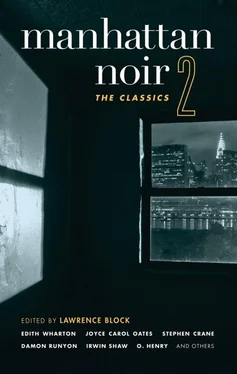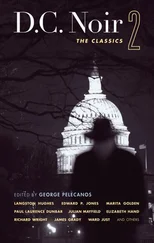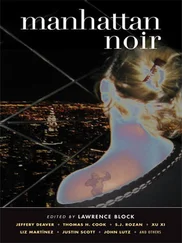That night she could not sleep. The weather had changed and a wild wind was abroad, blotting the stars with close-driven clouds. Mrs. Manstey rose once or twice and looked out of the window; but of the view nothing was discernible save a tardy light or two in the opposite windows. These lights at last went out, and Mrs. Manstey, who had watched for their extinction, began to dress herself. She was in evident haste, for she merely flung a thin dressing-gown over her night-dress and wrapped her head in a scarf; then she opened her closet and cautiously took out the kettle of kerosene. Having slipped a bundle of wooden matches into her pocket she proceeded, with increasing precautions, to unlock her door, and a few moments later she was feeling her way down the dark staircase, led by a glimmer of gas from the lower hall. At length she reached the bottom of the stairs and began the more difficult descent into the utter darkness of the basement. Here, however, she could move more freely, as there was less danger of being overheard; and without much delay she contrived to unlock the iron door leading into the yard. A gust of cold wind smote her as she stepped out and groped shiveringly under the clothes-lines.
That morning at three o’clock an alarm of fire brought the engines to Mrs. Black’s door, and also brought Mrs. Sampson’s startled boarders to their windows. The wooden balcony at the back of Mrs. Black’s house was ablaze, and among those who watched the progress of the flames was Mrs. Manstey, leaning in her thin dressing-gown from the open window.
The fire, however, was soon put out, and the frightened occupants of the house, who had fled in scant attire, reassembled at dawn to find that little mischief had been done beyond the cracking of window panes and smoking of ceilings. In fact, the chief sufferer by the fire was Mrs. Manstey, who was found in the morning gasping with pneumonia, a not unnatural result, as everyone remarked, of her having hung out of an open window at her age in a dressing-gown. It was easy to see that she was very ill, but no one had guessed how grave the doctor’s verdict would be, and the faces gathered that evening about Mrs. Sampson’s table were awestruck and disturbed. Not that any of the boarders knew Mrs. Manstey well; she “kept to herself,” as they said, and seemed to fancy herself too good for them; but then it is always disagreeable to have anyone dying in the house and, as one lady observed to another: “It might just as well have been you or me, my dear.”
But it was only Mrs. Manstey; and she was dying, as she had lived, lonely if not alone. The doctor had sent a trained nurse, and Mrs. Sampson, with muffled step, came in from time to time; but both, to Mrs. Manstey, seemed remote and unsubstantial as the figures in a dream. All day she said nothing; but when she was asked for her daughter’s address she shook her head. At times the nurse noticed that she seemed to be listening attentively for some sound which did not come; then again she dozed.
The next morning at daylight she was very low. The nurse called Mrs. Sampson and as the two bent over the old woman they saw her lips move.
“Lift me up — out of bed,” she whispered.
They raised her in their arms, and with her stiff hand she pointed to the window.
“Oh, the window — she wants to sit in the window. She used to sit there all day,” Mrs. Sampson explained. “It can do her no harm, I suppose?”
“Nothing matters now,” said the nurse.
They carried Mrs. Manstey to the window and placed her in her chair. The dawn was abroad, a jubilant spring dawn; the spire had already caught a golden ray, though the magnolia and horse-chestnut still slumbered in shadow. In Mrs. Black’s yard all was quiet. The charred timbers of the balcony lay where they had fallen. It was evident that since the fire the builders had not returned to their work. The magnolia had unfolded a few more sculptural flowers; the view was undisturbed.
It was hard for Mrs. Manstey to breathe; each moment it grew more difficult. She tried to make them open the window, but they would not understand. If she could have tasted the air, sweet with the penetrating ailanthus savor, it would have eased her; but the view at least was there — the spire was golden now, the heavens had warmed from pearl to blue, day was alight from east to west, even the magnolia had caught the sun.
Mrs. Manstey’s head fell back and smiling she died.
That day the building of the extension was resumed.
A poker game
by Stephen Crane
East 40s
(Originally published in 1902)
Usually a poker game is a picture of peace. There is no drama so low-voiced and serene and monotonous. If an amateur loser does not softly curse, there is no orchestral support. Here is one of the most exciting and absorbing occupations known to intelligent American manhood; here a year’s reflection is compressed into a moment of thought; here the nerves may stand on end and scream to themselves, but a tranquility as from heaven is only interrupted by the click of chips. The higher the stakes, the more quiet the scene; this is a law that applies everywhere save on the stage.
And yet sometimes in a poker game things happen. Everybody remembers the celebrated corner on bay rum that was triumphantly consummated by Robert F. Cinch of Chicago assisted by the United States courts and whatever other federal power he needed. Robert F. Cinch enjoyed his victory four months. Then he died, and young Bobbie Cinch came to New York in order to more clearly demonstrate that there was a good deal of fun in twenty-two million dollars.
Old Henry Spuytendyvil owns all the real estate in New York save that previously appropriated by the hospitals and Central Park. He had been a friend of Bob’s father. When Bob appeared in New York, Spuytendyvil entertained him correctly. It came to pass that they just naturally played poker.
One night they were having a small game in an uptown hotel. There were five of them, including two lawyers and a politician. The stakes depended on the ability of the individual fortune.
Bobbie Cinch had won rather heavily. He was as generous as sunshine, and when luck chases a generous man it chases him hard, even though he cannot bet with all the skill of his opponents.
Old Spuytendyvil had lost a considerable amount. One of the lawyers from time to time smiled quietly because he knew Spuytendyvil well, and he knew that anything with the name of loss attached to it sliced the old man’s heart into sections.
At midnight, Archie Bracketts, the actor, came into the room. “How you holding ’em, Bob?” said he.
“Pretty well,” said Bob.
“Having any luck, Mr. Spuytendyvil?”
“Blooming bad,” grunted the old man.
Bracketts laughed and put his foot on the round of Spuytendyvil’s chair. “There,” said he. “I’ll queer your luck for you.” Spuytendyvil sat at the end of the table. “Bobbie,” said the actor presently, as young Cinch won another pot, “I guess I better knock your luck.” So he took his foot from the old man’s chair and placed it on Bob’s chair. The lad grinned good-naturedly and said he didn’t care.
Bracketts was in a position to scan both of the hands. It was Bob’s ante and old Spuytendyvil threw in a red chip. Everybody passed out up to Bobbie. He filled in the pot and drew a card.
Spuytendyvil drew a card. Bracketts, looking over his shoulder, saw him holding the ten, nine, eight, and seven of diamonds. Theatrically speaking, straight flushes are as frequent as berries on a juniper tree but as a matter of truth the reason that straight flushes are so admired is because they are not as common as berries on a juniper tree. Bracketts stared; drew a cigar slowly from his pocket, and, placing it between his teeth, forgot its existence.
Читать дальше












